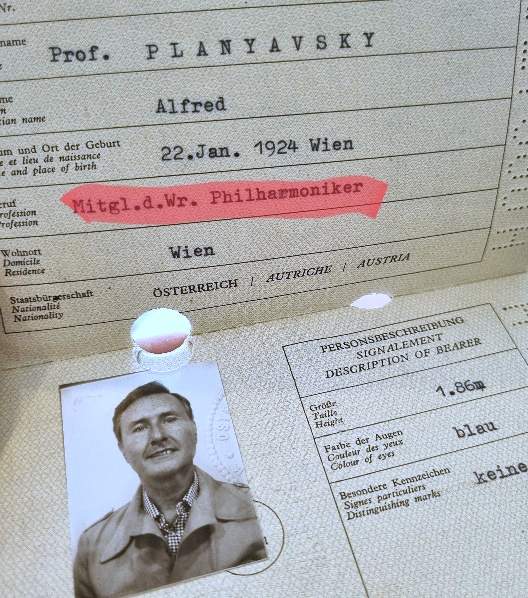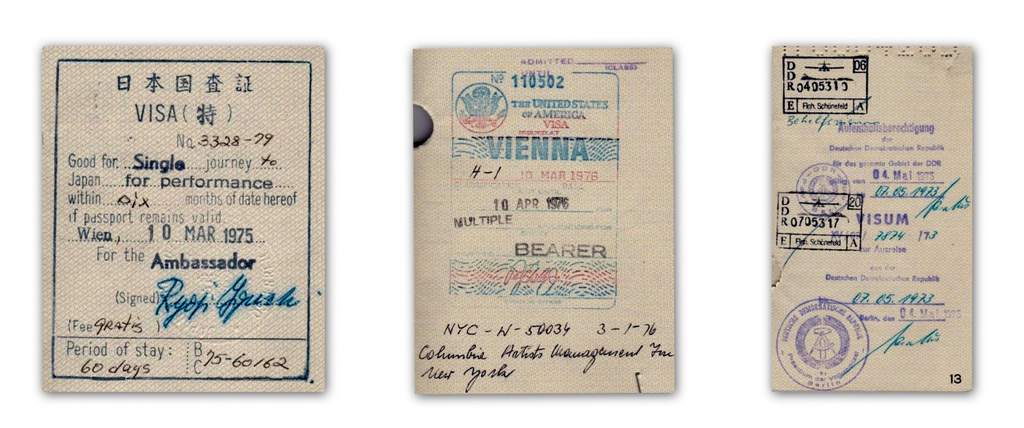Prof. Planyavsky, Vienna Philharmonic
Prof Planyavsky Vienna Philharmonic
Here comes another great collectible. I love those passports that cover not only passport history but also have a vivid background. Meet Professor Alfred Planyavsky, an Austrian double-bassist and music historian.
Born in Vienna in 1924, Planyavsky was a member of the boys’ choir Wiener Sängerknaben between 1933 and 1938. In 1946, he began studying as a tenor and double bass player at the Vienna Academy of Music. After seven years at the Academy, he joined the Vienna Symphony Orchestra in 1954. He was later a member of the world-famous Vienna State Opera Orchestra, the Vienna Philharmonic, and the Vienna Hofmusikkapelle. He has also been a double bass instructor for members of the Wiener Sängerknaben.1941-1946 Soldier and prisoner of war in the USA. Leader and tenor soloist of a prisoner of a war church choir.
Planyavsky conducted significant research into the history of double bass and Viennese music. His first major work was Geschichte des Kontrabasses (On the History of the Double Bass), first published in 1970 with a revised edition in 1984. This was followed by his 1989 volume Der Barock-Kontrabass Violone, which covered the history of the violone as a bass instrument in the Baroque era. It was issued in English translation as The Baroque Double Bass Violone and has been well received by critics. The Journal of the American Musical Instrument Society described his book, along with those of Brun and Elgar, as “pioneering” works on the evolution of the double bass but stated that the books are heavily reliant upon secondary sources. Prof Planyavsky Vienna Philharmonic
He received the Golden Decoration of Honor for Services to the Republic of Austria and the state of Vienna.
In addition to his books, Planyavsky wrote many articles for the journals Österreichische Musikzeitschrift and Das Orchester. In 1974 he began a collection of documents related to the double bass, called Kontrabass-Archiv (Double Bass Archive), and in 1986 donated it to the music collection of the Austrian National Library. His son Peter Planyavsky is an organist and composer. Planyavsky died on 18 June 2013 at age 89.
 His Austrian passport from 1972 is well traveled. It states as occupation “Member of the Vienna Philharmonic,” which brings him to Greece, South Korea, United Kingdom, Japan, East Germany (GDR), France, CSSR, Sweden, the USA, and Poland.
His Austrian passport from 1972 is well traveled. It states as occupation “Member of the Vienna Philharmonic,” which brings him to Greece, South Korea, United Kingdom, Japan, East Germany (GDR), France, CSSR, Sweden, the USA, and Poland.
The Japanese visas are granted “for performance.” The USA visa was at the request of the Columbia Artist Management in New York. Founded in 1930, the agency was a leading force of artist management in the classical music industry. Its recent roster included violinists Gidon Kremer, Anne-Sophie Mutter, Philippe Quint, Vadim Repin, conductors Seiji Ozawa, Valery Gergiev, and Mirga Gražinytė-Tyla, and VC Artists Charles Yang, Emmanuel Tjeknavorian and Paul Huang.
Columbia Artists previously represented luminary conductors, including Herbert von Karajan and Leonard Bernstein and pianists Vladimir Horowitz. Columbia Artists Management, Inc. announced in August 2020 that it would cease all operations immediately due to the effects of the ongoing COVID-19 pandemic.

FAQ Passport History
Passport collection, passport renewal, old passports for sale, vintage passport, emergency passport renewal, same day passport, passport application, pasaporte passeport паспорт 护照 パスポート جواز سفر पासपोर्ट
1. What are the earliest known examples of passports, and how have they evolved?
The word "passport" came up only in the mid 15th Century. Before that, such documents were safe conducts, recommendations or protection letters. On a practical aspect, the earliest passport I have seen was from the mid 16th Century. Read more...
2. Are there any notable historical figures or personalities whose passports are highly sought after by collectors?
Every collector is doing well to define his collection focus, and yes, there are collectors looking for Celebrity passports and travel documents of historical figures like Winston Churchill, Brothers Grimm, Johann Wolfgang von Goethe. Read more...
3. How did passport designs and security features change throughout different periods in history, and what impact did these changes have on forgery prevention?
"Passports" before the 18th Century had a pure functional character. Security features were, in the best case, a watermark and a wax seal. Forgery, back then, was not an issue like it is nowadays. Only from the 1980s on, security features became a thing. A state-of-the-art passport nowadays has dozens of security features - visible and invisible. Some are known only by the security document printer itself. Read more...
4. What are some of the rarest and most valuable historical passports that have ever been sold or auctioned?
Lou Gehrig, Victor Tsoi, Marilyn Monroe, James Joyce, and Albert Einstein when it comes to the most expensive ones. Read more...
5. How do diplomatic passports differ from regular passports, and what makes them significant to collectors?
Such documents were often held by officials in high ranks, like ambassadors, consuls or special envoys. Furthermore, these travel documents are often frequently traveled. Hence, they hold a tapestry of stamps or visas. Partly from unusual places.
6. Can you provide insights into the stories behind specific historical passports that offer unique insights into past travel and migration trends?
A passport tells the story of its bearer and these stories can be everything - surprising, sad, vivid. Isabella Bird and her travels (1831-1904) or Mary Kingsley, a fearless Lady explorer.
7. What role did passports play during significant historical events, such as wartime travel restrictions or international treaties?
During war, a passport could have been a matter of life or death. Especially, when we are looking into WWII and the Holocaust. And yes, during that time, passports and similar documents were often forged to escape and save lives. Example...
8. How has the emergence of digital passports and biometric identification impacted the world of passport collecting?
Current modern passports having now often a sparkling, flashy design. This has mainly two reasons. 1. Improved security and 2. Displaying a countries' heritage, icons, and important figures or achievements. I can fully understand that those modern documents are wanted, especially by younger collectors.
9. Are there any specialized collections of passports, such as those from a specific country, era, or distinguished individuals?
Yes, the University of Western Sidney Library has e.g. a passport collection of the former prime minister Hon Edward Gough Whitlam and his wife Margaret. They are all diplomatic passports and I had the pleasure to apprise them. I hold e.g. a collection of almost all types of the German Empire passports (only 2 types are still missing). Also, my East German passport collection is quite extensive with pretty rare passport types.
10. Where can passport collectors find reliable resources and reputable sellers to expand their collection and learn more about passport history?
A good start is eBay, Delcampe, flea markets, garage or estate sales. The more significant travel documents you probably find at the classic auction houses. Sometimes I also offer documents from my archive/collection. See offers... As you are already here, you surely found a great source on the topic 😉
Other great sources are: Scottish Passports, The Nansen passport, The secret lives of diplomatic couriers
11. Is vintage passport collecting legal? What are the regulations and considerations collectors should know when acquiring historical passports?
First, it's important to stress that each country has its own laws when it comes to passports. Collecting old vintage passports for historical or educational reasons is safe and legal, or at least tolerated. More details on the legal aspects are here...
Does this article spark your curiosity about passport collecting and the history of passports? With this valuable information, you have a good basis to start your own passport collection.
Question? Contact me...

